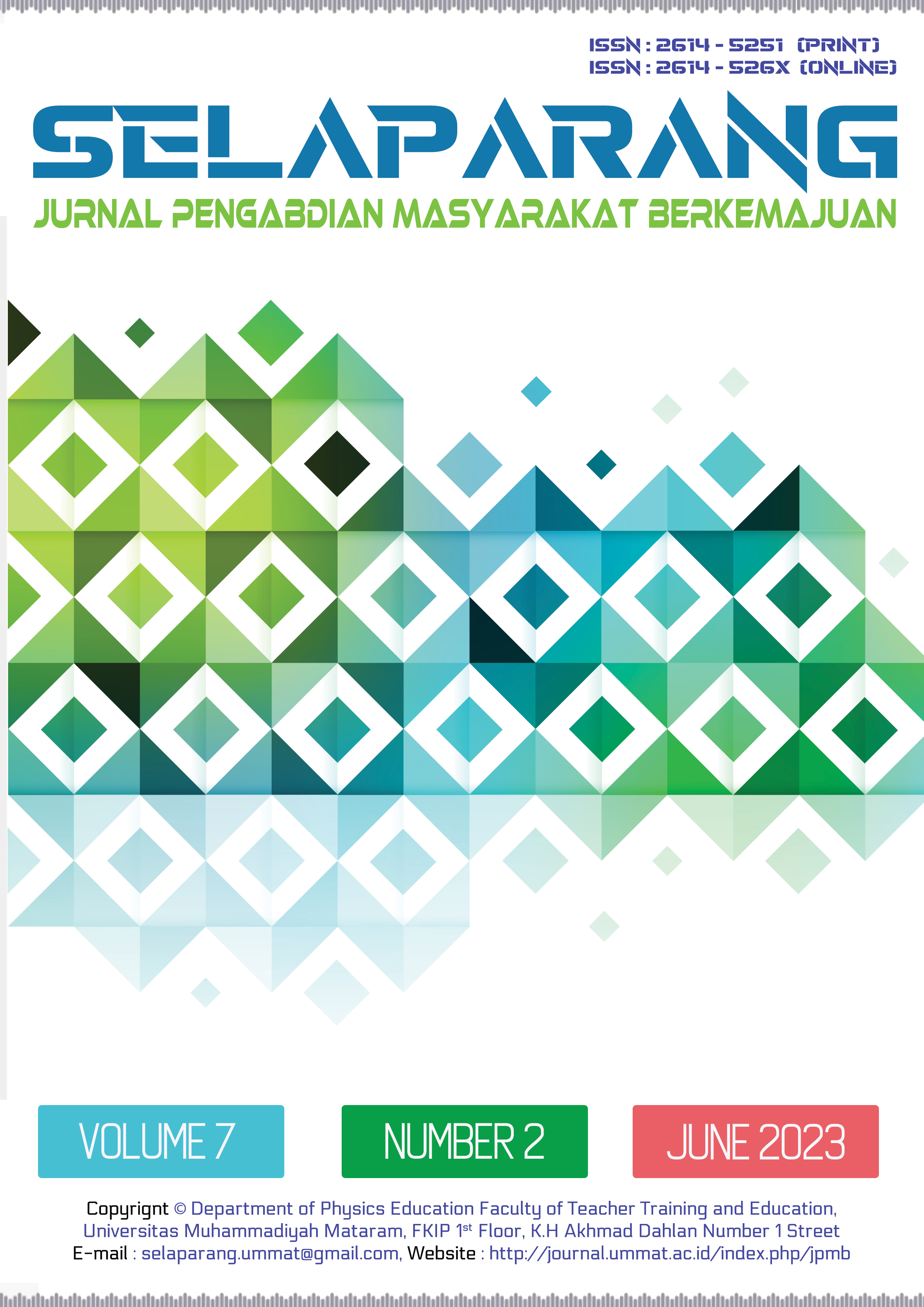PELATIHAN PERSONAL BRANDING DAN DIGITAL LITERACY BAGI PELAKU UMKM DI KOTA KUPANG
DOI:
https://doi.org/10.31764/jpmb.v7i2.14270Keywords:
personal branding, digital literacy, MSMEsAbstract
ABSTRAK
Para pelaku UMKM di Kota Kupang Nusa Tenggara Timur terus mengalami peningkatan setiap tahunnya. Namun sebagian besar UMKM yang tumbuh masih memasarkan produk secara tradisional, hal ini terjadi karena kurangnya pemahaman pelaku UMKM terhadap teknologi digital dalam memasarkan produk dan jasanya. Hasil identifikasi menunjukkan bahwa banyak UMKM di Kota Kupang menggunakan teknologi sederhana dalam pemasaran, yaitu didominasi dengan media Whatsapp dan Facebook. Adapun permasalahan lain dari para pelaku UMKM ini yaitu masih kesulitan dalam membangun citra usaha mereka untuk dikenal luas oleh masyarakat (konsumen). Berdasarkan permasalahan tersebut tim mengusul melalui program hibah PNBP berinisiatif untuk memberikan pelatihan terkait Personal Branding dan Digital Literacy. Manfaat kegiatan agar mitra pelaku UMKM begitu memahami akan pentingnya personal branding dan elemen- elemen dalam digital literacy sehingga produk dikenal luar di pasaran. Dalam kegiatan ini kami menggunakan metode edukasi langsung dan public assitance dengan melibatkan para pelaku UMKM yang baru memulai usaha yang dipandang sesuai dengan kebutuhan peserta PKM atau selanjutnya disebut mitra. Hasil dari pelatihan personal branding dan digital literacy mendapat tanggapan yang positif, dinilai dapat memberikan wawsan dan ilmu, dan memberikan inspirasi. Hampir semua pelaku usaha ingin mempraktekan bisnis online ini dalam pengambangan usahanya dan bagaimana mereka terus memperkenalkan pada konsumen terkait brand atau citra mereka.
Â
Kata kunci: personal branding; digital literacy; UMKM
Â
ABSTRACT
MSME actors in the city of Kupang, East Nusa Tenggara, continue to increase every year. However, most of the MSMEs that have grown are still marketing their products in a traditional way; this is due to a lack of understanding by MSME actors about using digital technology to market their products and services. The identification results show that many MSMEs in Kupang City use simple technology in marketing, which is dominated by WhatsApp and Facebook media. The other problem for these MSME actors is that they still have difficulties building their business image to be widely known by the public (consumers). Based on these problems, the team proposed, through the PNBP grant program, to take the initiative to provide training related to personal branding and digital literacy. The benefits of this activity are that MSME partners really understand the importance of personal branding and elements of digital literacy so that their products are known outside the market. In this activity, we use direct education methods and public assistance by involving MSME actors who are just starting a business that is deemed appropriate to the needs of PKM participants, hereinafter referred to as partners. The results of personal branding and digital literacy training received positive responses and were considered to be able to provide insight, knowledge, and inspiration. Almost all business actors want to practice this online business in developing their businesses and how they continue to introduce consumers to their brand image.
Â
Keywords: personal branding; digital literacy; MSMEs
References
Alborn, T. (2010). Economics and business. The Cambridge Companion to Victorian Culture, 2(1), 61–79. https://doi.org/10.1017/CCOL9780521886994.004
Franzia, E. (2018). Personal Branding Melalui Media Sosial. Prosiding Seminar Nasional Pakar, 15–20. https://doi.org/10.25105/pakar.v0i0.2690
Gilster, P., & Watson, T. (1999). Digit al Lit eracy by by. Meridian: A Middle School Computer Technologies Journal, 141. https://www.academia.edu/1354072/Digital_Literacy?bulkDownload=thisPaper-topRelated-sameAuthor-citingThis-citedByThis-secondOrderCitations&from=cover_page
Habibie, I. A. (2022). Digitalisasi UMKM Dari Hulu Hingga Hilir. Dewan Teknologi Informasi Dan Komunikasi (Wantiknas), 03, 1–14.
Hafner, C. A., Chik, A., & Jones, R. H. (2015). Digital literacies and language learning. Language Learning and Technology, 19(3), 1–7. https://doi.org/10.4324/9781003106609-15
IKP, P. A. (2019). (2021). Perkembangan Ekonomi Digital di Indonesia. Jurnal Ekonomi Digital, 3(2), 21–27.
Jones, R. H., & Hafner, C. A. (2021). Understanding Digital Literacies: A Practical Introduction. Understanding Digital Literacies: A Practical Introduction, 1–321. https://doi.org/10.4324/9781003177647
Nasrullah, R., Aditya, W., Satya, T. I., Nento, M. N., Hanifah, N., Miftahussururi, & Akbari, Q. S. (2017). Materi Pendukung Literasi Digital: Gerakan Literasi Nasional. Kementerian Pendidikan Dan Kebudayaan, 33. https://gln.kemdikbud.go.id/glnsite/wp-content/uploads/2017/10/cover-materi-pendukung-literasi-finansial-gabung.pdf
Rangarajan, D., Gelb, B. D., & Vandaveer, A. (2017). Strategic personal branding—And how it pays off. Business Horizons, 60(5), 657–666. https://doi.org/10.1016/j.bushor.2017.05.009
Riwu, Y. F. (2021). Pengaruh Inovasi Terbuka Terhadap Kinerja UMKM dan Peran Platform Digital Sebagai Varibael Pemoderasi. 3–4.
Undang-Undang Republik Indonesia Nomor 20 Tahun. (2008). Undang-Undang Republik Indonesia Nomor 20 Tahun 2008. 1.
Downloads
Published
Issue
Section
License
The copyright of the received article shall be assigned to the journal as the publisher of the journal. The intended copyright includes the right to publish the article in various forms (including reprints). The journal maintains the publishing rights to the published articles.

Selaparang : Jurnal Pengabdian Masyarakat Berkemajuan is licensed under a Creative Commons Attribution-ShareAlike 4.0 International License.

